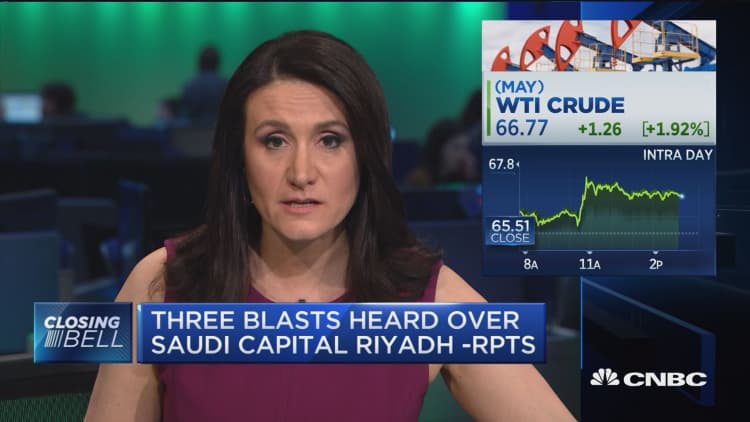
The missile attacks by Iran-aligned Houthis aimed at Saudi Arabia's civilian areas and oil facilities have proven unsuccessful, but they are a provocation at a time when the Middle East is already at risk of a widening conflict.
With oil prices at a three-year high, it's possible prices could flare up even more if hostilities spread beyond Syria or Yemen, two hot spots that are seen as proxy wars pitting Iran against both Israel and Saudi Arabia.
The U.S. is set to strike Syria in the very near future because of its chemical attack on civilians, and both Russia and Iran have said they stand with Syria.
"We're at the pivot point. It's a binary outcome. If it's a pinprick in Syria, we've seen the price gains. We'll sell off afterwards. If Iranian assets, in particular in Syria, get hit, it's a game changer," said John Kilduff, energy analyst and founder of Again Capital.
U.S. oil prices are up nearly 8 percent this week so far, as tensions rose surrounding Syria. West Texas Intermediate futures temporarily rose above $67 per barrel, and Brent crude futures were above $72 per barrel.
"Now you're talking about $75 WTI being on the table, and $80 Brent," said Helima Croft, global head of commodity strategy at RBC. She said oil would rise much higher if the proxy war escalates to a real war between Iran and Saudi Arabia or Israel.
Trump said the U.S. would respond in Syria, after its government allegedly again used chemical weapons against civilians Saturday, killing dozens and wounding hundreds more. Syria has denied it.
"If this is all contained to Syria we've probably seen the bulk of the rise. The issue you get into is if there's a strike on Iranian assets in Syria, a direct hit on Saudi, or a scenario where the Saudis and Israelis team up to take it to Iran directly, that's where you get into triple-digit oil price land," said Kilduff.
Meanwhile, Houthis in Yemen continued to step up a campaign to lob missiles at Saudi targets, including an oil tanker in international waters last week. Three missiles were intercepted by Saudi defense forces Wednesday, before they could hit targets in Najran or Riyadh. The Houthis claimed to have targeted the Saudi Defense Ministry and a Saudi Aramco distribution facility in Najran.
"To me, I was more worried about the tanker. ... That raises the whole prospect of that critical waterway not being viewed as secure. Five million barrels of crude and refined product [per day] now has to be considered at risk," said Croft. "That's what goes through the strait."
Saudi Arabia is the world's largest oil exporter, and now the third-largest producer after the U.S. since it has cut back on production as part of a broader deal between OPEC and Russia to boost oil prices.
"Certainly geopolitical risk is back in the price, and what happens to Syria could certainly stoke prices. It's not only Syria. It's also the May 12 deadline on reviewing the Iran deal," said Daniel Yergin, vice chairman of IHS Markit. "But it's not only the Mideast. It's this new tension between the United States and Russia, two of the world's three biggest oil producers."
The U.S. imposed a new round of sanctions on Russia this week for its election meddling, and Russia has been a blunt critic of Trump's planned attack on Syria.
The president has also been opposed to the Iran nuclear deal, which lifted sanctions on the country in return for Iran ending its nuclear program. With the addition of former U.N. Ambassador John Bolton as national security advisor just this week, it seems more likely the deal will be abandoned by the U.S.
"When you look at the Middle East, you have more fault lines that could erupt than you or I could count," said Richard Haass, president of the Council on Foreign Relations. "[The Saudis] see the Iranian hand behind everything that's happening in Yemen. Iran is their sworn enemy so I don't think the Saudis are going to let up. I think they ought to look for a way to get out. This has the potential to be their Vietnam. ... It's hard to see how with the current course of action the Saudis are on is going to end, or end well for them."
Saudi Crown Prince Mohammed Bin Salman, known as MBS, led the kingdom into the regional war after the Houthi rebels forced Yemen's president, Abed Rabbo Mansour Hadi, into exile
"The main theaters that Iran is playing in right now remains Syria and Iraq, and this is to a certain extent ancillary to that. They're trying to embarrass MBS, and they're trying to highlight the Saudi war in Yemen to make sure it gets public attention," said Henry Rome, Iran researcher at Eurasia Group. "The more attention it gets, the worse publicly it is for the Saudis, especially at a time when they're trying to put on a different face for the West."
The Houthis, in fact, ramped up their missile attacks just as MBS arrived in the U.S. on a tour to promote his Vision 2030, an effort to attract investments and diversify the kingdom away from its dependence on oil.
"In terms of a major escalation, we're not at that point yet, especially if we're talking about a major escalation between Saudi and Iran," said Rome, adding the 'X' factor would be a hit on Saudi civilians. That would require a more major response from the Saudi government.
As for the Iran nuclear deal, If the U.S. drops out, it would again impose sanctions on Iranian oil and its financial sector, including insurance, and shipping. It's unclear how Europe and other parties to the deal would respond.
"Our base case here is European trade and investment basically collapses. Oil imports to Korea and Japan drop significantly and Iran will be looking to lash out in the region," said Rome. "It could be in terms of the Houtis in Yemen, but there are a lot of options. In any case, the decision will be made by the supreme leader and it will be strategic and thought out."
Rome said it's likely European companies back away from deals with Iran so as not to lose access to the U.S. market, if Trump drops out of the nuclear agreement.
WATCH: Missiles intercepted over Saudi Arabia



